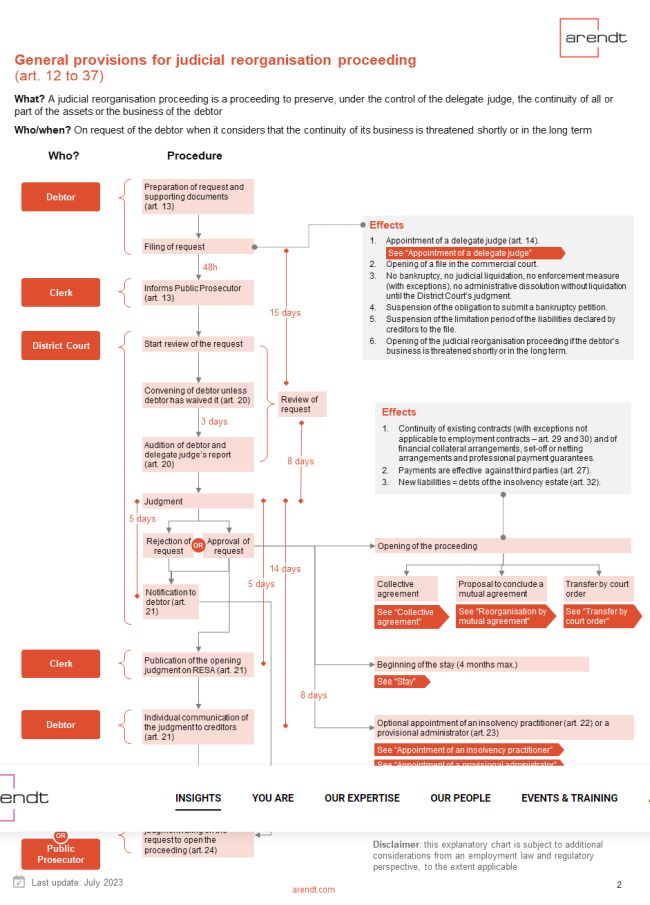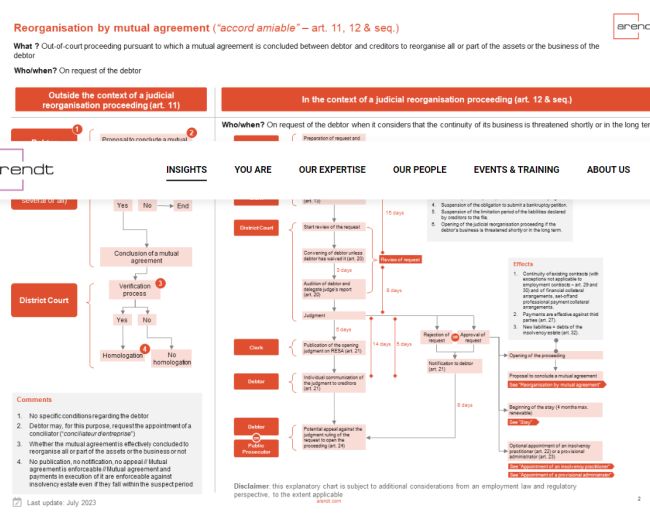- within Insolvency/Bankruptcy/Re-Structuring, Real Estate and Construction, Litigation and Mediation & Arbitration topic(s)
- with readers working within the Banking & Credit industries
The largest ever reform to modernise Luxembourg insolvency law is due to be adopted by the Luxembourg Parliament on Wednesday 19 July 2023
In short
Luxembourg will further increase the attractiveness and competitiveness of its restructuring and insolvency framework – the law on business preservation and modernisation of bankruptcy law (Law), which aims to modernise insolvency law and also grant a second chance to entrepreneurs, is due to be voted by the Luxembourg Parliament on Wednesday 19 July 2023.
The Law implements EU Directive 2019/1023 of 20 June 2019, whose objective is to contribute to the proper functioning of the internal market and remove obstacles to the exercise of fundamental freedoms, such as the free movement of capital and freedom of establishment, which result from differences between national laws and procedures concerning preventive restructuring, insolvency, discharge of debt, and disqualifications.
It should be noted that for creditors benefiting from financial collateral arrangements (e.g. pledges), set-off or netting arrangements and professional payment guarantees, these should remain enforceable and unaffected by the judicial reorganisation proceedings introduced by the Law.
Main measures
1. New preventive reorganisation procedures
The Law provides for three new, largely voluntary, preventive reorganisation procedures adapted to the size of the relevant business:
(i) Conciliation (conservatory measure)
(ii) Judicial reorganisation proceedings
(iii) Reorganisation by mutual agreement (out-of-court procedure)
1.1. Conciliation
The debtor requests that the Minister for the Economy or the Minister for Small and Medium-Sized Enterprises appoint a conciliator (conciliateur d'entreprise) to facilitate the reorganisation of all or part of its assets or its business.
1.2. Judicial reorganisation proceedings
Judicial reorganisation proceedings aim to preserve the continuity of all or part of the assets or the business of the debtor under the supervision of the court.
Three types of judicial reorganisation proceedings
The Law provides for three different judicial reorganisation proceedings depending on the intended objective:
- Mutual agreement – The debtor intends to obtain a stay (sursis) to conclude a mutual agreement. The proceeding is judicial compared to the above-mentioned reorganisation by mutual agreement (out-of-court procedure), so that the common rules listed below are applicable.
- Collective agreement – The debtor intends to reach a collective agreement (accord collectif) with some of its creditors on a reorganisation plan. The Law embeds the UK cross-class cram-down mechanism (also provided for in the EU Directive of 20 June) within the framework of this procedure. This enables a restructuring plan to bind dissenting creditor classes under certain circumstances.
- Transfer by court order – All or part of the assets or the business of the debtor is transferred, by court order, to one or several third parties. This proceeding may be voluntary and involves employees and employee representatives.
Common rules governing the judicial reorganisation proceedings
At the pre-opening phase
Once the debtor requests the opening of a procedure:
- A delegate judge is appointed.
- The obligation to file a bankruptcy petition is suspended.
- The Public Prosecutor is informed.
- No bankruptcy, judicial liquidation or enforcement measures (with exceptions) can be declared or taken until the judgment of the District Court ruling on the debtor's request.
When the procedure is opened
- A stay (sursis) for a maximum of four months begins.
- Existing agreements and financial arrangements are still enforceable (with exceptions, not applicable to employment agreements) – financial collateral arrangements (e.g. pledges), set-off or netting arrangements and professional payment guarantees should remain enforceable and unaffected by a judicial reorganisation procedure, thus continuing to benefit creditors.
- Payments are effective against third parties.
- New liabilities are considered as being debts of the insolvency estate.
1.3. Reorganisation by mutual agreement
Reorganisation by mutual agreement (accord amiable) is a voluntary out-of-court proceeding pursuant to which the debtor and at least two of its creditors mutually agree to reorganise all or part of the assets or the business of the debtor. Once approved by the District Court (tribunal d'arrondissement), the mutual agreement is enforceable and payments pursuant to it are enforceable against the insolvency estate even if they fall within the suspect period.
2. Identification of businesses in difficulties and businesses likely to be declared bankrupt
New measures are put in place to, at an early stage, identify businesses in difficulties and businesses likely to be declared bankrupt.
- Minister for the Economy and Minister for Small and Medium-Sized Enterprises – The Minister for the Economy and the Minister for Small and Medium-Sized Enterprisesare responsible for identifying debtors in financial difficulties who are likely to jeopardise the continuity of their business. A series of indicators and information, including annual accounts, debts due to public authorities and redundancies for economic reasons, are made available to them. They are also allowed to convene a meeting with the debtor to obtain information on the state of its affairs and to inform them about the potential reorganisation measures.
- Cellule d'évaluation des entreprises en difficulté – Creation of a dedicated public body, including representatives from the tax and social authorities: the Cellule d'évaluation des entreprises en difficulté, which is responsible for assessing the appropriateness of bankruptcy petitions.
What's next?
The Law will enter into force on the first day of the third month following its publication in the Luxembourg Official Journal, i.e. during Q4 2023.
It is worth noting that further EU reform on insolvency law is in progress. In December 2022, the EU Commission published a proposal for a new insolvency directive that harmonises certain aspects of insolvency law.
The content of this article is intended to provide a general guide to the subject matter. Specialist advice should be sought about your specific circumstances.




